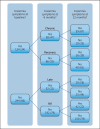The Course and Impact of Poststroke Insomnia in Stroke Survivors Aged 18 to 65 Years: Results from the Psychosocial Outcomes In StrokE (POISE) Study
- PMID: 28161702
- PMCID: PMC5346918
- DOI: 10.1159/000455751
The Course and Impact of Poststroke Insomnia in Stroke Survivors Aged 18 to 65 Years: Results from the Psychosocial Outcomes In StrokE (POISE) Study
Abstract
Background: Insomnia symptoms are common in the population and have negative psychosocial and functional sequelae. There are no prospective studies of the course of such symptoms and their impact, if any, in stroke survivors. This prospective cohort study investigated insomnia after stroke in working-age adults and evaluated its impact on psychological and functional outcomes over the subsequent year.
Methods: We prospectively recruited 441 young (<65 years) consecutive stroke survivors from 20 public hospitals in the New South Wales Stroke Service network. Participants were assessed by self-report and interview at 28 days, 6 months, and 12 months after stroke. Insomnia was defined using a common epidemiological measure of sleep disturbance and daytime consequences. Depression, anxiety, disability, and return to work were assessed through standardized measures.
Results: The point prevalence of insomnia at each time point in the year after stroke was stable at 30-37% and more common in females. Fifty-eight (16%) of all participants reported "chronic" insomnia, with symptoms at both baseline and 6 months later. At 12 months, this group was more likely to be depressed (OR 6.75, 95% CI 2.78-16.4), anxious (OR 3.31, 95% CI 1.54-7.09), disabled (OR 3.60, 95% CI 2.07-6.25), and not have returned to work, compared to those without insomnia over the same period.
Conclusions: Chronic insomnia has a negative effect on disability and return to work 1 year after stroke even after adjusting for demographic, psychiatric, and disability factors. Identifying and appropriately targeting insomnia through known effective treatments may improve functional outcomes after stroke. .
Keywords: Anxiety; Cohort; Depression; Disability; Insomnia; Stroke; Work.
© 2017 The Author(s) . Published by S. Karger AG, Basel.
Figures
References
-
- American Academy of Sleep Medicine . International Classification of Sleep Disorders: Diagnostic and Coding Classification of Sleep Disorders 697 Manual. 2nd ed. Westchester: American Academy of Sleep Medicine; 2005.
-
- Chen YK, Lu JY, Mok VC, Ungvari GS, Chu WC, Wong KS, Tang WK. Clinical and radiologic correlates of insomnia symptoms in ischemic stroke patients. Int J Geriatr Psychiatry. 2011;26:451–457. - PubMed
-
- Leppavuori A, Pohjasvaara T, Vataja R, Kaste M, Erkinjuntti T. Insomnia in ischemic stroke patients. Cerebrovasc Dis. 2002;14:90–97. - PubMed
-
- Palomaki H, Berg A, Meririnne E, Kaste M, Lonnqvist R, Lehtihalmes M, Lonnqvist J. Complaints of poststroke insomnia and its treatment with mianserin. Cerebrovasc Dis. 2003;15:56–62. - PubMed
-
- Tang WK, Lu JY, Liang HJ, Chan TT, Mok V, Ungvari GS, Wong KS. Is insomnia associated with suicidality in stroke? Arch Phys Med Rehabil. 2011;92:2025–2027. - PubMed
Publication types
MeSH terms
LinkOut - more resources
Full Text Sources
Other Literature Sources
Medical


